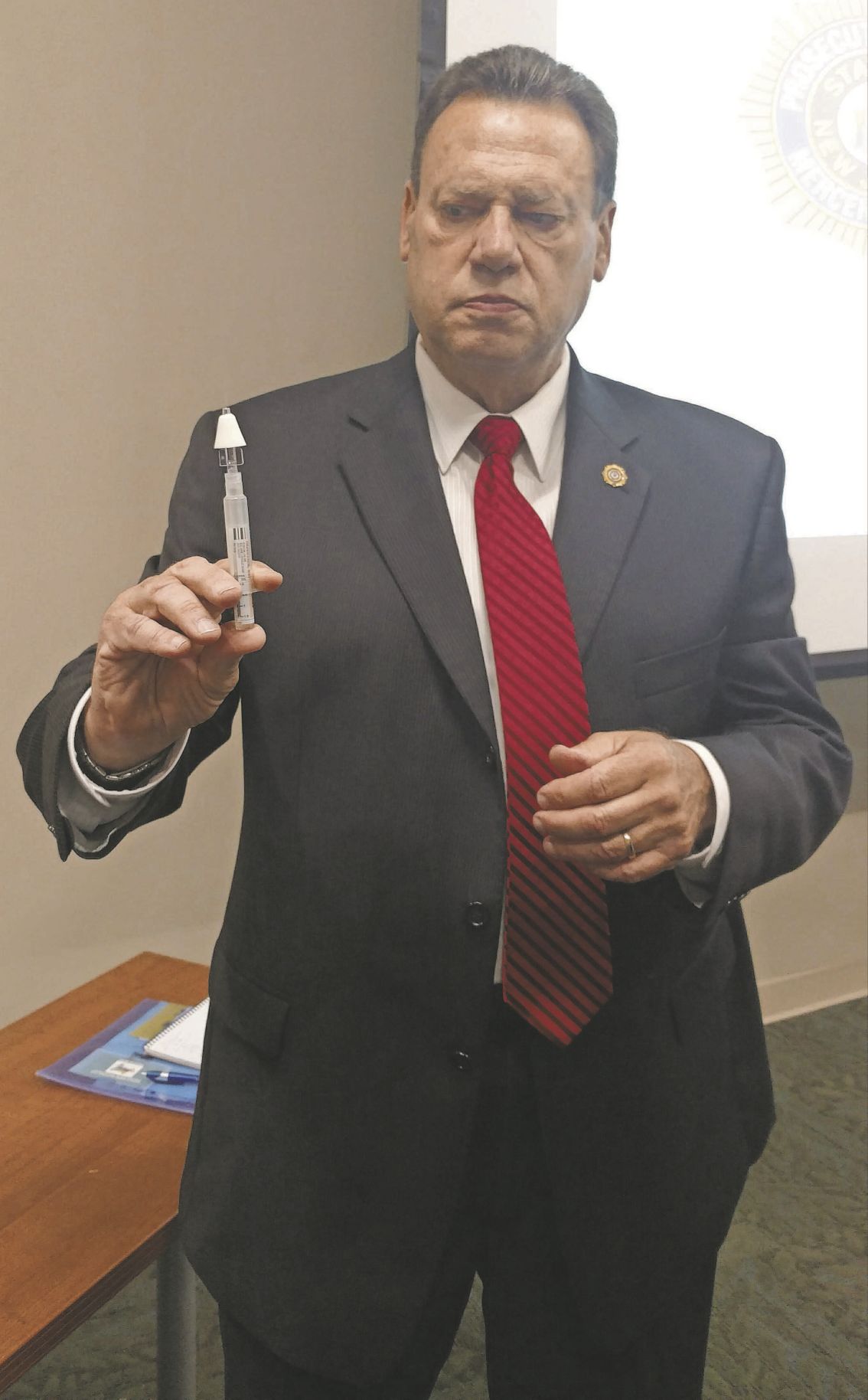By Andrew Martins, Managing Editor
More than 500 vials of naloxone were recently distributed to police departments throughout Mercer County, as the prosecutor’s office and Capital Health announced a partnership to combat opioid abuse.
Speaking at a press conference at Capital Health Hopewell announcing the infusion of the drug, which combats the effects of a drug overdose, Acting Prosecutor Angelo Onofri said the collaboration ensures that the county’s police and first responders are properly equipped to revive anyone suffering from an overdose..
“Narcan has given people a second chance at life,” Mr. Onofri said.
In an effort to replenish the county’s stockpile of naloxone, the generic name for Narcan, which expired last month, Mr. Onofri said the prosecutor’s office reached out to Capital Health for assistance in obtaining a fresh batch.
As a result, Capital Health agreed to provide 530 vials to the county, which were then handed out to departments in Hamilton Township, Hopewell Township and Princeton University, among others.
Mr. Onofri said that amount of naloxone allows the prosecutor’s office to equip “every police department and every police car in Mercer County with this life saving drug.”
In addition, Capital Health President and CEO Dr. Al Maghazehe said the health-care provider has agreed to continually stock the county with the drug for the foreseeable future.
“This is not about money, it’s not about business – it’s about saving lives,” Dr. Maghazehe said. “We have to do whatever we can do to try to minimize the impact of drugs in our community.”
According to the prosecutor’s office, police have used the drug in life-saving situations approximately 131 times since it was originally provided in November 2014. Since then, police successfully revived 115 individuals.
There were only 10 instances, according to officials, that the drug was unable to revive a patient and that person died.
According to the Heroin and Opiate Task Force of Mercer County, there were 55 heroin-related deaths in 2015.
“Quite often, we see these victims and unfortunately there wasn’t much we could do before this drug became available,” Dr. Maghazehe said. “We were losing kids, losing people, constantly and that’s really difficult for us in this field.”
Though heroin has been a major problem across the state due to its high availability and low cost, Mr. Onofri said Mercer County has become a hotbed of heroin abuse.
The acting prosecutor cited estimates from the Drug Enforcement Administration that puts heroin purity at 62 percent in Mercer County, marking an increase from 58 percent in 2015.
“Heroin is cheap, it’s readily available and we have to do something before our kids get hooked on this very dangerous drug,” Mr. Onofri said.
To help combat the county’s drug problem, the prosecutor’s office announced its OneVoice initiative, which will aim at educating people about opiate addiction and recovery.
Originally created in Hunterdon County, the OneVoice initiative in Mercer County will work with government leaders, healthcare professionals, law enforcement, overdose victims’ families and the faith community to help spread the word about heroin addiction and abuse.
“Through OneVoice, we plan to work with the schools and recovery professionals to host opioid awareness programs for students and parents, such as the one that was held in Princeton Township last year,” Mr. Onofri said.
The prosecutor’s office is also exploring the Community Addiction Recovery Effort (CARE), spearheaded by Robbinsville Police Chief Chris Nitti, Mayor Dave Fried and Detective Scott Kivet, for use in Mercer County.
Under CARE, officers provide resources and access to treatment to individuals who have been arrested in opiate-related matters.
Starting this year in the Hamilton Township School District, the prosecutor’s office will also spend time during high school health classes to discuss the Overdose Prevention Act, which was signed into law by Gov. Chris Christie in 2013.
Mr. Onofri said he plans to hold a meeting in September with all of the mayors in Mercer County to try to get the program into every high school.
“We have to get out into the community,” Mr. Onofri said. “We have to spread this message to make parents and students aware of the evils of opioids and just how addictive they are.”

